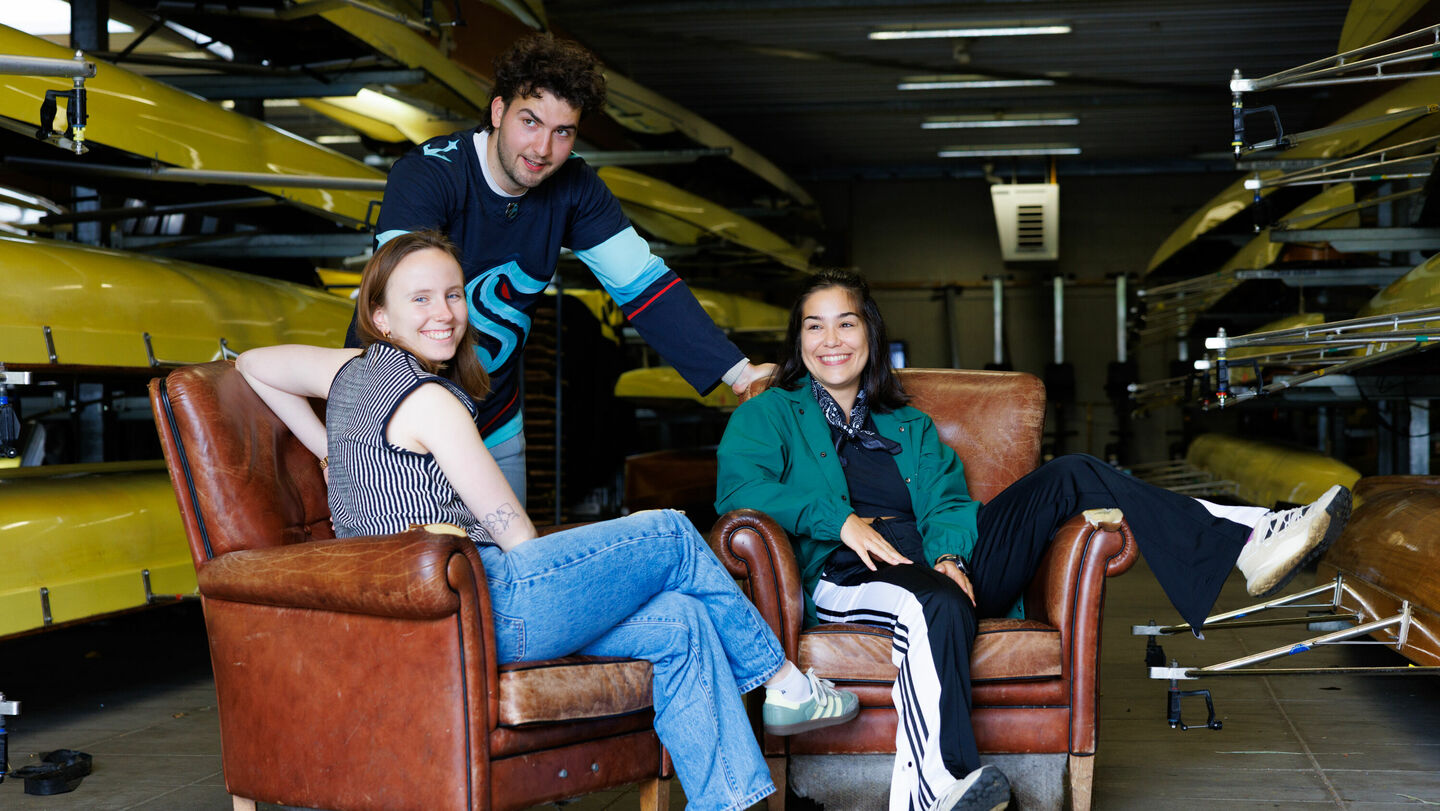
"Integration not easy, but definitely worth it"
These three internationals feel completely at home in the Netherlands thanks to Thêta
They speak fluent Dutch and are perfectly capable of riding a bike after having a drink or two, but they draw the line at eating sandwiches. These internationals decided to completely immerse themselves in Dutch student life and join rowing club Thêta. With success: “I feel completely at home here.”
Immediately upon setting foot on Dutch soil, Victoire Simon from Belgium (the French part), Simeon Rangelov from Bulgaria, and Eneritz Murillo from Spain joined rowing club Thêta. Eneritz was the only international student to do so five years ago, while Simeon and Victoire were joined by several other internationals. Now, there’s even an entire rowing team made up of international first-year students. Still, Thêta chooses to keep Dutch as the culture and working language of the association. Unmistakably so, the students say.
For these international students who didn’t speak the language, joining Thêta was a huge leap of faith. “I really didn’t understand anything,” Victoire says when remembering the association’s introductory weekend. “Everything was in Dutch.” She did sometimes ask things in English and got answers, but a whole lot simply passed her by. For Simeon, things went a step further even. He came to live in a rowing house, where his roommates “helped” him learn Dutch quickly - in a typically student-like way. “There was a rule that you weren’t allowed to speak English in the kitchen. If you did, you got something thrown at you. This even applied to the Dutch people living in the house, by the way. One way around it was to sing, because the rule was specifically about speaking. Also, I was often required to write a little text of a hundred words in Dutch before I was allowed to have dinner.” The other two can’t help but laugh at this.
Formal Dutch
Simeon did take Dutch classes at university, but quickly abandoned them. As a result, you can’t tell from his accent that he’s from abroad, but if you pay attention to what he says, you’ll hear that there’s room for improvement in terms of grammar. “People will look at me like: why do you talk like that?” Eneritz did continue taking language classes, up to the highest level. Thanks to that foundation, she managed to secure an internship with the municipality in her third year. “Suddenly, I had to start reading all kinds of policy texts in formal Dutch.”
Integrating, however, is more than just learning a language, the students say. Especially at an association like Thêta, where Dutch student culture is omnipresent. And that includes all the written and unwritten rules that come with it. Victoire can now list them all. “For example, you’re not allowed to order only one beer, and you can’t be on your phone in the bar area.” Dutch first-years don’t know those rules either, notes Maud Bolck of Thêta. “True, but you’re told in Dutch what all the rules are,” Victoire responds. “As a foreigner, you don’t know they exist. Although you learn about them quite quickly, because you get sprayed with water if you don’t follow them.”
Bread
What the students find most shocking about Dutch culture is the amount of bread that’s consumed. Eneritz: “I would be a traitor if I ate bread for lunch.” Victoire isn’t a fan either. “I’ll open the fridge and there will be slices of salami and cheese and bread: everything I hate.” She also had a hard time getting used to how busy everyone is and how that’s considered normal. “Everyone was like: I’m a fifth-year and put more time into committees than into my studies. I couldn’t imagine that, but now I’m like that myself.” Because everyone is so busy, she says it’s also hard to meet up with people. Simeon even purchased a calendar specifically for that purpose.
At night, I’ll sometimes think back to what someone said or did and I’ll find it ever so slightly offensive
It sometimes takes some adaptability, integrating properly. But that it has been successful is evident from the fact that Simeon regularly thinks: this could be cheaper. He’s also irritated by other internationals who park their bikes incorrectly – “everywhere it’s not allowed.” As an adopted Dutchie, he knows that you can move anything by bike: closets, a lounge set, tables. But he does find it odd that everyone rides their bikes to the association gala. “And not a nice civilian bike at that, but one that you can hear from a mile away. I can’t get used to it.” Victoire learned to cycle (drunk): “That was really an experiment.” Now she – like Eneritz – often takes cycling trips.
One thing none of the three have mastered yet is Dutch directness. Eneritz: “At night, I’ll sometimes think back to what someone said or did and I’ll find it ever so slightly offensive.” Although Simeon doesn’t think about it much, he can relate. What strikes him is that most people will take pride in how direct they are. Victoire is sometimes confused by this. “I’ll be like: are these people my friends, or not?” She herself sometimes tries to be more direct, which isn’t easy for a Belgian. “But otherwise they won’t understand me.”
Dutch waters
Thêta tries to help international students navigate Dutch waters as much as possible. A buddy system of sorts has been set up, for example, and current internationals have conversations with the newcomers. There is also a dictionary of rowing terms, which contains not only the translations of the words, but also their explanations in English. However, anyone who really wants to feel at home within the association – and that includes Dutch students – will have to actively participate, Maud says. “These three students have joined committees and are living in a rowing house, really connecting with Thêta. People who do that will stay at the association for longer and have a better time here.”
Does it pay to learn the language and do your best to integrate? It does, according to these three internationals. Although, says Eneritz, everyone is free to make their own choice in that regard. Either way, she says, it’s good to get out of your comfort zone. The others agree. Victoire: “If you like the idea of being well-integrated but you lack the courage to work on it, do so anyway. It has brought me a lot. I really call the Netherlands my home now.”


Discussion